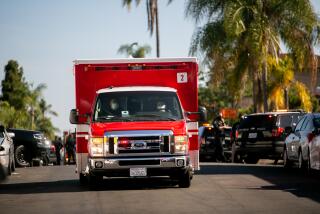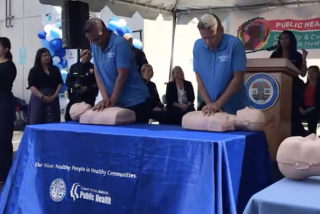What You Can Do Before the Paramedics Arrive
- Share via
You’re alone, and after some minor exertion, there’s a sudden pain in your chest. It’s not severe, but it’s rather uncomfortable. You start sweating, feel nauseated, are short of breath. Indigestion or the start of a heart attack? What should you do?
You’re peeling onions, the knife slips, you cut your finger deeply, and the blood starts flowing fast. What should you do?
Sitting in your backyard on a Sunday afternoon, a bee stings you and immediately you start to experience a severe allergic reaction. What should you do?
A recent bit of medical advice making rounds on the Internet purported to explain how someone could save himself from a heart attack simply by coughing a certain way. The message, titled “How to Survive a Heart Attack When Alone,” advised people who believed they were having a heart attack to breathe deeply and cough every two seconds. The message claimed that this procedure, called cough CPR, could save the lives of heart attack victims. Continue coughing and breathing, says the message, until help arrives or until the heart is felt to be beating normally again.
“The message got a lot of attention, but it’s not proven,” said Dr. Vincent Bufalino, a cardiologist. “Be wary of medical advice you get from the Internet.”
Although the veracity of the Internet tale seems rather flimsy, it does raise the question: Just what is the best way to save oneself while alone in an emergency?
The scenarios above are among the more common medical emergencies that may occur while you’re alone, and here is how you should cope with them.
*
Heart Attack
“A typical warning sign of an impending heart attack is an exertion-related pain in the chest,” said Bufalino, who is president of Midwest Heart Specialists, a cardiology-physicians group based in Naperville, Ill. He also is national chairman of the Emergency Cardiac Care Committee of the American Heart Assn.
“There may also be shortness of breath out of proportion to the amount of effort expended,” Bufalino said. “Or shortness of breath alone may be the first sign--walking up a flight of stairs, carrying packages in from the car, doing anything physical that you shouldn’t have any discomfort doing--these are the warning signs.
“I use the word ‘discomfort’ because a lot of people think [a heart attack] feels like an elephant standing on your chest. It doesn’t. It can be a tightness, a pressure, a burning in the chest.”
Intense pain may signal a heart attack, Bufalino said. But often there is only a sense of discomfort, which in the first stages of heart attack can be subtle. The discomfort can spread to the arms, the back, the neck and occasionally the jaw.
“If you think you’re having a heart attack, the most important thing to do, bar none, without question--don’t wait--call 911,” Bufalino said. “After calling 911, take an aspirin. It acts as a blood thinner and could be helpful. There’s nothing else to do. Try not to panic. Help is close by, and getting excited works against you, although everybody [having a heart attack] is scared.”
A major problem among people having a heart attack, Bufalino said, is the fear of looking foolish--calling 911, being brought to an emergency room in an ambulance and then discovering it’s a false alarm.
“We’d rather have nine false alarms out of 10,” Bufalino said. “We want people to get to the hospital early. We take chest pains seriously. Some people [having heart attacks] sit home for hours taking Alka-Seltzer and Maalox.”
*
Severe Cuts
For most bleeding caused by deep cuts, applying direct pressure to the wound is the best measure, according to Dr. Joe Boyle, assistant director of emergency medicine at Central Du- Page Hospital in Winfield, Ill. Press a paper or cloth towel, clothing or gauze pads against the wound, he said. There is no need to be concerned about the cleanliness or sterility of these materials because emergency experts will clean the cut appropriately in the emergency room.
“You can also put your thumb directly on the cut,” he said. “I tell patients to remember the three Ps to stopping bleeding: First is direct pressure. Then patience--pressure must be applied for 15 minutes to allow time for clotting. It may seem like an hour, but at least 15 minutes of pressure. Third is no peeking, because if you peek at the wound, you’ll have to start all over again with the application of pressure. If your hand or finger is cut, get [the wounded area] above the heart; lie down and hold your hand above your chest.”
If the wound stops bleeding totally after 15 minutes of direct pressure, you can more than likely put a bandage on it. Wash the area and put on a tight Band-Aid. If bleeding does not stop after 15 minutes of pressure, you probably need stitches and should go to a hospital emergency room.
Rarely do severe cuts require the application of a tourniquet, Boyle said.
*
Stroke
Sudden inability to speak, facial paralysis or paralysis on one side of the body and changes in vision are symptoms of a stroke. Call 911 immediately, but don’t take an aspirin, Boyle said. “There’s medication now that if taken within three hours of the onset of symptoms may reverse damage,” he added.
*
Choking on Food
You can throw yourself forward over the back of a chair, with pressure on your upper abdomen, and this may help. “We’ve heard of people who have done it,” Boyle said of this self-applied Heimlich maneuver, but it’s not advised in medical literature. Sometimes sticking a finger down your throat may dislodge the piece of food causing the blockage.
“If you’re able to breathe but feel a choking sensation or obstruction in your throat, calling 911 is not necessary,” Boyle said. “Do not eat or drink anything, however, and seek medical attention at the emergency room or with your regular physician.”
*
Animal Bites
“All animal bites--from dogs, cats, whatever--require a trip to a hospital emergency room,” Boyle said. “Don’t treat bites yourself. You may need antibiotics.”
*
Bee Stings
If you know you’re allergic to bee stings, ask your physician about getting an injectable medication to use when needed. But even if you inject yourself after a sting, go to a hospital emergency room anyway. If you don’t know whether you’re allergic but experience shortness of breath or difficulty in swallowing after a bee sting, go immediately to an emergency room. These symptoms may indicate anaphylactic shock, a severe allergic reaction that can lead to death.
If you’re not allergic, apply ice to the area that was stung. Swelling will probably occur but should subside in three to five days, Boyle said.
“There’s a slight possibility of infection, so if the area is still swollen and red after three to five days, see your regular physician or go to an emergency room.”
*
After Calling 911
Whatever your emergency, after calling 911 be sure to unlock your front door so emergency medical personnel have easy access to your residence. So advises Betsy Lampe, a retired paramedic in Highland City, Fla.
“If you’re chronically ill and on several medications, prepare for emergencies by giving trustworthy neighbors a key to your residence and information on your medical conditions and what medications you’re taking,” Lampe said.
“If you’re allergic and have injectable epinephrine and/or chewable antihistamine that may be out of date, or you can’t find it when you need it, liquid antihistamine such as Benadryl or a mist inhaler may work just as well.”
*
Marc Davis writes for the Chicago Tribune, a Tribune company.






